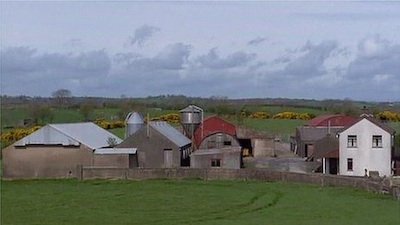
Leave to seek a judicial review of how the PSNI police investigated a gang responsible for the murders of up to 120 innocent Catholics was granted last week after it emerged that a key police report on the gang was suddenly “shelved” five years ago.
The murder gang, based at a farm (pictured) in Glenanne, Armagh, contained members of the (then RUC) police and the British Army’s Ulster Defence Regiment.
In a landmark case, the brother of one schoolboy victim issued proceedings against the PSNI, pointing to a collective failure in conducting inquiries through their Historical Enquiries Team (HET).
Thirteen-year-old Patrick Barnard was one of four people who died in a bombing at the Hillcrest Bar in Dungannon, County Tyrone in March 1976.
Lawyers for the PSNI did not oppose the application after a former senior member of the HET admitted to the family that a key report into the Glenanne gang was halted in 2010, despite being 80% complete.
Former London police detective Steve Morris had been in charge of a special HET team set up to carry out a review of the killers who targeted prominent Catholics in the mid-Ulster area during the 1970s. His disclosure appears to have guaranteed a full judicial review.
With the HET now effectively shut down, Patrick’s brother, Edward Barnard, wants a court order compelling the PSNI to complete a full investigation and publish the findings.
Dungannon man Norbett McCaughey, whose son James was killed at the Hillcrest Bar, welcomed the input from Mr Morris. “We are happy he came forward, he said. “This is very significant.”
He said James was so badly injured in the bomb that he could only be identified by the pioneer pin he was wearing on his jacket lapel.
“Even up to now his memory has never left us. We have carried this for 39 years,” he said. The grieving father said he has little faith in the authorities.
“I am 79 and have lived through the war and I know what they are and they will never change and I don’t care what way they paint themselves,” he said.
“We want justice, honesty and complete closure that their lives were taken.”
In 2010 the British government apologised for the “gross intrusion” when the RUC and British soldiers raided the murdered child’s home just hours after he was killed.
They falsely claimed they had intelligence that the explosion had been an IRA ‘own goal’ and that the schoolboy had been carrying a bomb that had exploded prematurely.
Lawyer for the Bernard family, Peter Corrigan, said the latest development is “significant in holding the state to account for colluding with the loyalist Glenanne gang”.
“The court will now be invited to quash the original PSNI decision not to investigate, to compel the state to accept that there existed a state practice of collusion through the Glenanne series, and that an independent investigation should now be commenced.”
Anne Cadwallader from the Pat Finucane Centre, whose book on the subject will feature as part of the case, said the investigation into the Glenanne gang needs to be carried out urgently.
“Many of the bereaved in this series of tragic events have already endured the loss of their relatives, followed by over three decades of official lies,” she said.
She said bereaved families have only received “silence and obfuscation” from the state.
“They lost their relatives in the most traumatic of circumstances and, over the succeeding three decades, have been lied to by both the RUC and the British political establishment,” she said.
“London would be well advised to cut its losses at this stage and admit its servants and agents were involved in systemic collusion throughout the conflict. The alternative is lengthy, costly and ultimately self-defeating legal action.”
![[Irish Republican News]](https://republican-news.org/graphics/title_gifs/rn.gif)
![[Irish Republican News]](https://republican-news.org/graphics/title_gifs/harp.gif)

